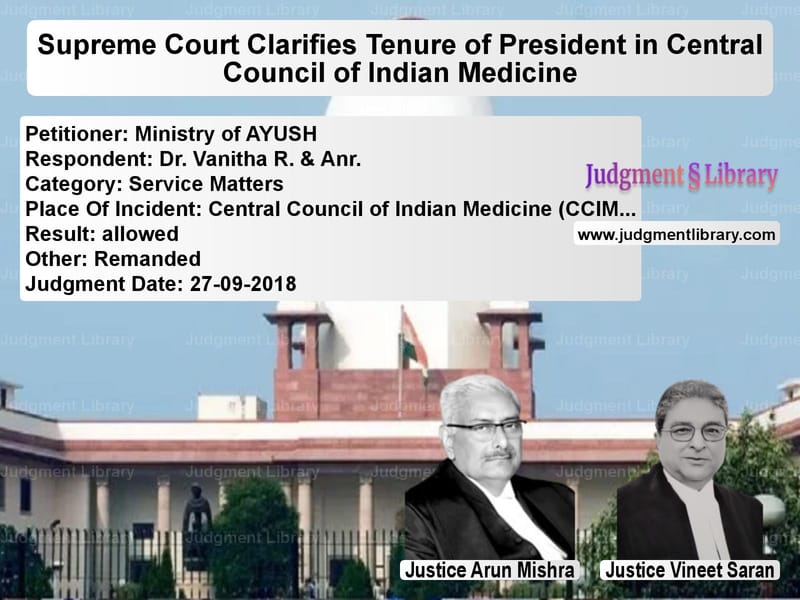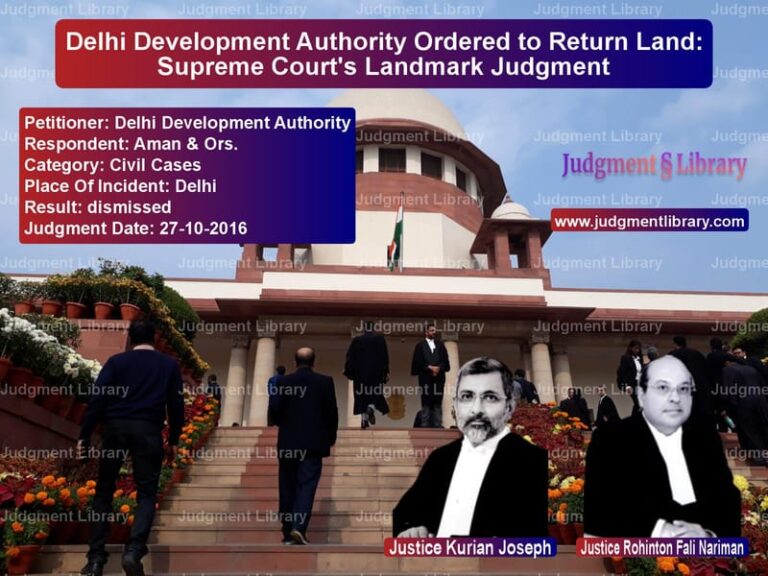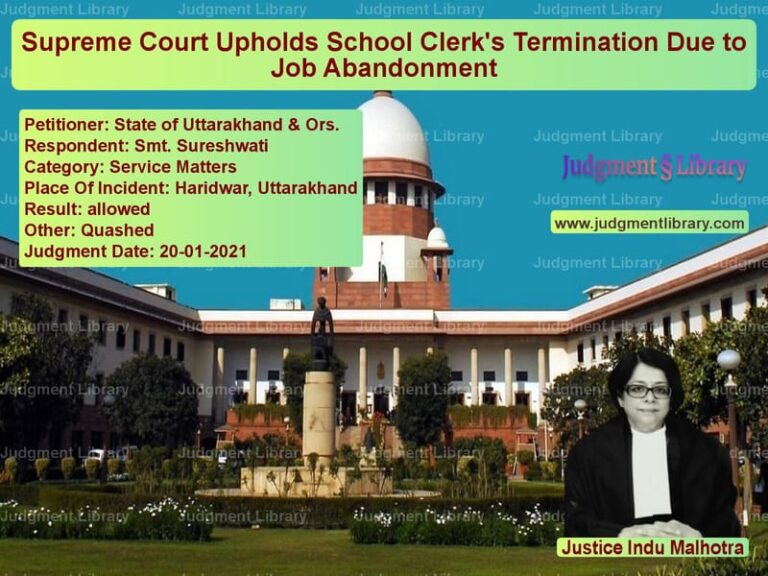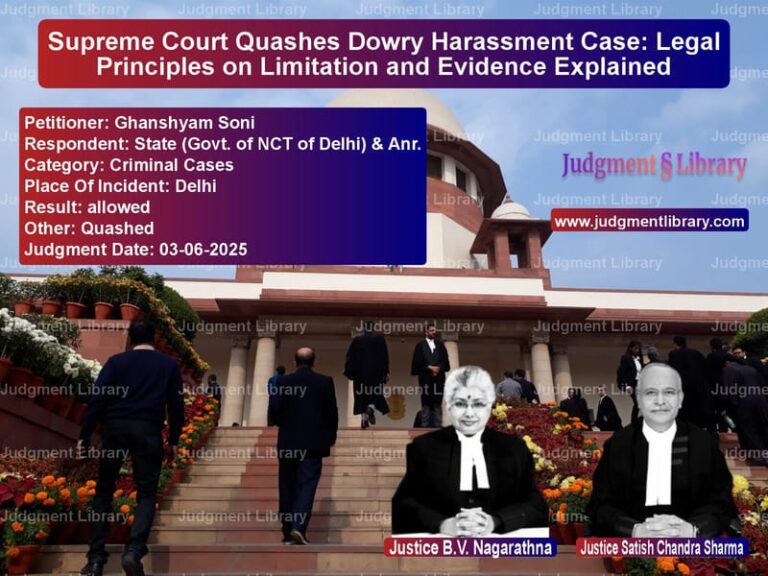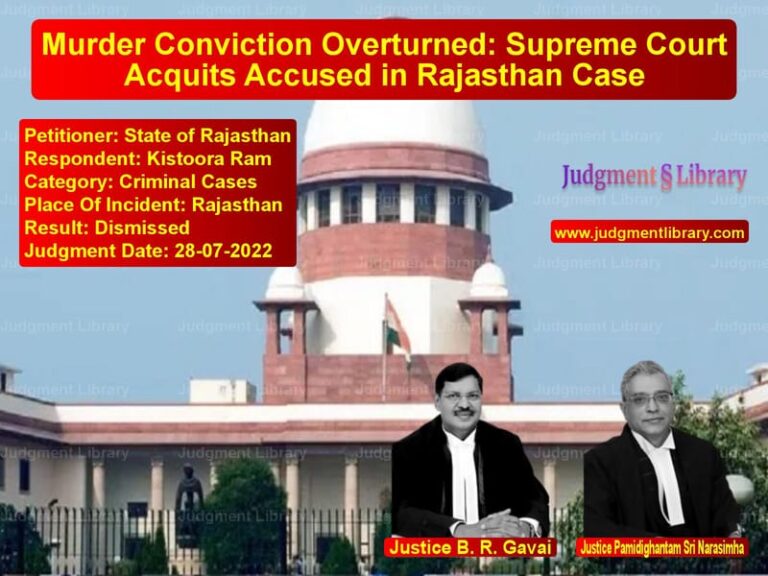Supreme Court Clarifies Tenure of President in Central Council of Indian Medicine
The Supreme Court, in its judgment dated September 27, 2018, in the case of Ministry of AYUSH vs. Dr. Vanitha R. & Anr., provided an important interpretation of Section 7 of the Indian Medicine Central Council Act, 1970. The ruling resolved the issue of whether a President elected to the Central Council of Indian Medicine (CCIM) through a casual vacancy election is entitled to a full five-year tenure or only the remaining term of the predecessor.
Background of the Case
The dispute arose when a member representing Uttarakhand in the Central Council of Indian Medicine (CCIM) ceased to be a member on August 27, 2016. This member was also holding the position of President of CCIM. If he had continued as a member, his tenure as President would have ended on July 4, 2017.
To fill the vacancy for President, an election was conducted on March 14, 2017, in which Dr. Vanitha R. was elected as President of CCIM. However, a dispute arose regarding whether she was elected for a fresh five-year term or merely the remainder of the term of the previous President.
Key Legal Issues
The case revolved around the interpretation of Section 7 of the Indian Medicine Central Council Act, 1970, particularly:
- Whether a President elected in a casual vacancy holds office for the full five-year term or only the remaining period of the predecessor.
- Whether the Central Government had the authority to limit the tenure of the President.
Arguments by the Ministry of AYUSH
The Ministry of AYUSH argued that:
- Section 7(3) of the Act states that a person elected to fill a casual vacancy should only hold office for the remaining term of the predecessor.
- Since the previous President’s term would have ended on July 4, 2017, Dr. Vanitha R.’s tenure should also have ended on that date.
- As per Section 7(1), a full five-year term applies only when a President is elected under normal circumstances, not in cases of casual vacancies.
- The High Court erred in setting aside the Ministry’s decision and reinstating Dr. Vanitha R. as President.
Arguments by Dr. Vanitha R.
Dr. Vanitha R. contended that:
- Her election was conducted under Section 7(1), which provides a five-year term for a President.
- The Ministry of AYUSH had initially ruled in her favor in its August 24, 2017, order, stating that Section 7(3) does not apply to Presidents.
- The Ministry later reversed its stand in its March 8, 2018, order, declaring that her tenure ended on July 4, 2017, which was illegal.
- She had a legitimate expectation of serving a full five-year term.
Supreme Court’s Observations
The Supreme Court carefully analyzed the provisions of the Indian Medicine Central Council Act, 1970 and made the following key observations:
1. Distinction Between Regular and Casual Vacancies
The Court held that the Act differentiates between a regular election (where a full five-year term applies) and a casual vacancy election, where the newly elected person serves only the remainder of the predecessor’s term.
“A casual vacancy in the Central Council must be filled for the remainder of the term of the predecessor, as explicitly stated in Section 7(3) of the Act.”
2. President’s Term is Linked to Membership
The Court ruled that since a President must first be a member of the Council before holding office, their tenure is naturally tied to their term as a member.
“Once a member ceases to hold office, they automatically vacate the position of President.”
3. Ministry’s Interpretation was Correct
The Court upheld the Ministry’s decision that the tenure of Dr. Vanitha R. ended on July 4, 2017, stating that:
“The tenure of an individual elected due to a casual vacancy cannot exceed the remaining period of the predecessor’s term.”
4. High Court’s Ruling Overturned
The Supreme Court set aside the High Court’s ruling, stating that:
“The High Court erred in concluding that the respondent’s election was for a full five-year term. The correct interpretation of Section 7(3) limits her tenure to the remainder of the predecessor’s term.”
Final Judgment
Based on these findings, the Supreme Court ruled:
- The appeal by the Ministry of AYUSH was allowed.
- The High Court’s judgment was set aside.
- Dr. Vanitha R.’s tenure as President of CCIM ended on July 4, 2017.
- The fresh election held on March 23, 2018, was declared valid, and the results were ordered to be counted and announced within ten days.
Implications of the Judgment
This ruling has several important implications:
- Clarification of Tenure Rules: It establishes that Presidents elected through casual vacancies can only serve the remainder of their predecessor’s term.
- Limits on Ministry’s Power: The Ministry cannot arbitrarily extend a President’s tenure beyond what is legally permissible.
- Prevention of Legal Disputes: This decision clarifies succession rules within CCIM and similar statutory bodies.
- Ensuring Fair Elections: The judgment upholds the integrity of the election process by preventing individuals from holding office beyond their legitimate term.
The ruling serves as a landmark decision in the interpretation of tenure provisions under the Indian Medicine Central Council Act, 1970, ensuring that appointments and elections within regulatory bodies adhere to clear legal principles.
Petitioner Name: Ministry of AYUSH.Respondent Name: Dr. Vanitha R. & Anr..Judgment By: Justice Arun Mishra, Justice Vineet Saran.Place Of Incident: Central Council of Indian Medicine (CCIM).Judgment Date: 27-09-2018.
Don’t miss out on the full details! Download the complete judgment in PDF format below and gain valuable insights instantly!
Download Judgment: Ministry of AYUSH vs Dr. Vanitha R. & Anr Supreme Court of India Judgment Dated 27-09-2018.pdf
Direct Downlaod Judgment: Direct downlaod this Judgment
See all petitions in Public Sector Employees
See all petitions in Promotion Cases
See all petitions in Recruitment Policies
See all petitions in Judgment by Arun Mishra
See all petitions in Judgment by Vineet Saran
See all petitions in allowed
See all petitions in Remanded
See all petitions in supreme court of India judgments September 2018
See all petitions in 2018 judgments
See all posts in Service Matters Category
See all allowed petitions in Service Matters Category
See all Dismissed petitions in Service Matters Category
See all partially allowed petitions in Service Matters Category

